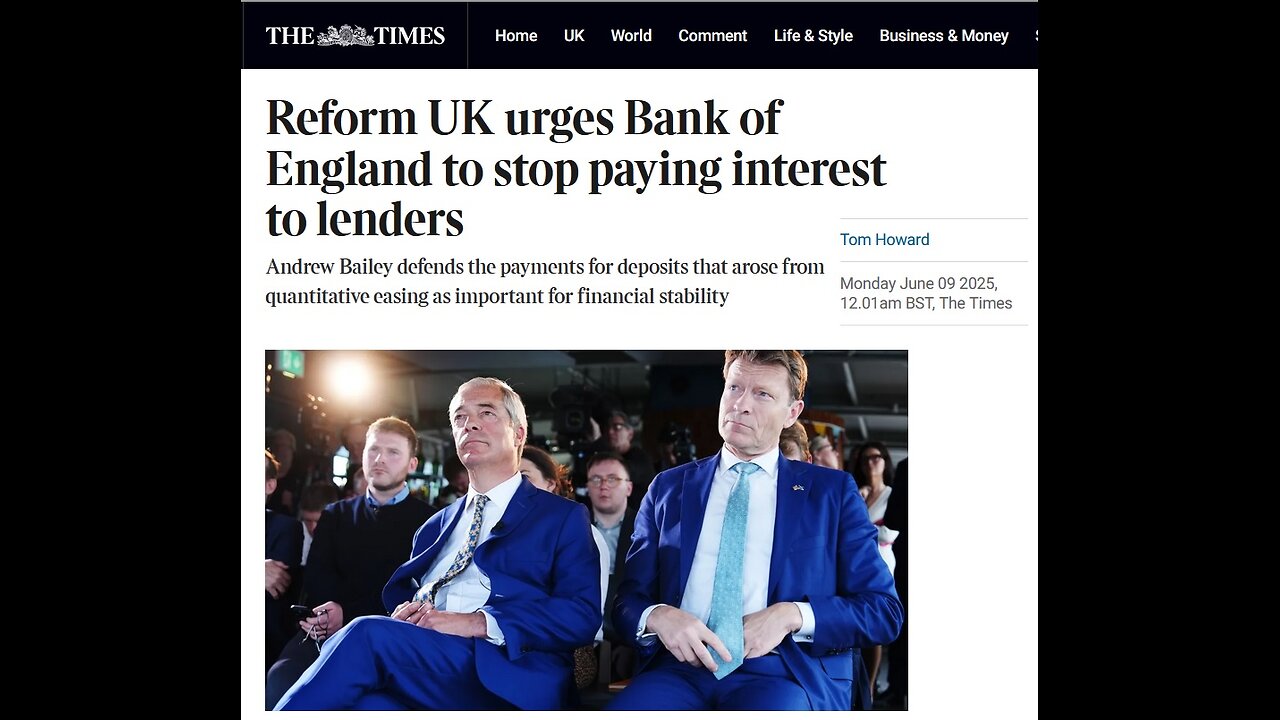Premium Only Content

Farage: stop paying £35bn interest on £700bn private BoE bonds Steve Hall UK vs the money markets
Reform UK urges Bank of England to stop paying interest to lenders
Andrew Bailey defends the payments for deposits that arose from quantitative easing as important for financial stability
The Bank of England has no plans to stop paying interest on lenders’ deposits, despite having been accused by Reform UK of “unnecessarily wasting tens of billions of pounds of taxpayers’ money”.
Richard Tice, deputy leader of the party, wrote to Andrew Bailey, the governor of the Bank of England, over the weekend, claiming that the Bank was prioritising the “enriching of City institutions” at the expense of the public.
Under the Bank’s quantitative easing (QE) programme, which lasted from 2009 to 2021, about £895 billion was created by buying bonds from commercial lenders, which then deposited the money they received at the central bank. Interest is paid on these reserves, which stand at about £700 billion, at the base rate of 4.25 per cent.
• Mehreen Khan: The Treasury, the Bank and a saving they could make tomorrow
Reform wants the Bank to do away with these interest payments. Other advocates of cutting reserve remuneration in the UK include Gordon Brown, the former prime minister, and two former deputy governors of the Bank, Sir Paul Tucker and Sir Charlie Bean.
Some, including Gertjan Vlieghe, a former member of the monetary policy committee, have said that to stop paying the full interest rate could be tantamount to a debt default.
But Tice, in his letter, said “that is simply untrue”, and added: “This money was created out of thin air by the Treasury and the Bank of England to support the economy during two periods of acute national stress over the past 18 years. It was never the property of City institutions. It is no coincidence that commercial bank profits have soared as interest rates rose as the Bank of England paid out tens of billions of this voluntary interest. These institutions cannot believe their luck.”
The payments by the Bank of England could save up to £35 billion a year, according to Reform
VUK VALCIC/SOPA IMAGES VIA GETTY IMAGES
When rates were low, the Bank’s gain from QE amounted to £124 billion, which was transferred to the Treasury. Now that borrowing costs have risen it is suffering losses, which are also being borne by the Treasury. Meanwhile, commercial lenders are enjoying a windfall. Four of Britain’s big high street banks — Barclays, Lloyds Banking Group, NatWest and Santander UK — disclosed last year that the interest they earned on reserves totalled about £9.2 billion in 2023.
Reform has estimated that scrapping interest on central bank reserves could save up to £35 billion a year, which would fund a “Great British tax cut”.
A spokesman for the Bank of England said “the governor set out the Bank’s views on this matter to the Treasury select committee [last week]”. Bailey said paying the full interest rate encouraged mainstream banks to hold some of their reserves with the Bank of England, which has “financial stability benefits”.
Any changes to interest payments, he argued, would incentivise banks to move their reserves away from the central bank and into UK government bonds, meaning “any presumed benefit to the public purse from reducing interest payments in this way would … be illusory”.
The big banks are also against any changes. A spokesman for UK Finance, the industry trade association, said any moves to lower reserve remuneration would have “real consequences for the UK economy and likely lead to consumers and businesses facing higher banking costs”.
Many of those calling for an overhaul claim that the present system, which was introduced in 2006, is an exception rather than the norm in central banking. During the inflationary wars of the 1980s, big central banks paid no interest on commercial bank reserves.
A tiered reserve system, adopted by the European Central Bank in 2023, is one idea being proposed. The ECB pays no interest on the portion of money that lenders are required to keep at the bank as a minimum reserve. There is no minimum reserve requirement with the Bank of England.
-
 LIVE
LIVE
Inverted World Live
3 hours agoJoe Exotic Calls From Prison | Ep. 118
4,077 watching -
 56:24
56:24
DeVory Darkins
11 hours ago $0.94 earnedFederal Judge issues shocking order against Trump as Chicago Mayor pulls insane stunt
96.3K243 -
 LIVE
LIVE
Badlands Media
9 hours agoBaseless Conspiracies Ep. 153
5,271 watching -
 23:51
23:51
Stephen Gardner
2 hours ago🚨Trump did the UNTHINKABLE!
16.5K43 -
 2:54:14
2:54:14
Barry Cunningham
5 hours agoBREAKING NEWS: PRESIDENT TRUMP SAYS HE MAY INVOKE THE INSURRECTION ACT! AND NOW WE KNOW WHY!
25.6K14 -
 40:13
40:13
Clownfish TV
11 hours agoMagic the Gathering Champion BANNED from Tournament Over MAGA Hat?! | Clownfish TV
9.36K19 -
 2:49:47
2:49:47
TimcastIRL
4 hours agoTrump Considers Invoking INSURRECTION ACT To Deploy National Guard to Portland | Timcast IRL
157K80 -
 10:05:38
10:05:38
Dr Disrespect
12 hours ago🔴LIVE - DR DISRESPECT - BLACK OPS 7 - GIVE ME BACK MY NUKE
130K16 -
 LIVE
LIVE
Drew Hernandez
2 hours agoTARGETED LEFTIST TERRORIST ATTACK IN CHICAGO & ISRAEL GEOFENCING U.S. MEGA CHURCHES
940 watching -
 8:58
8:58
Degenerate Jay
13 hours agoXbox Game Pass Is Getting Ridiculous
9.48K
